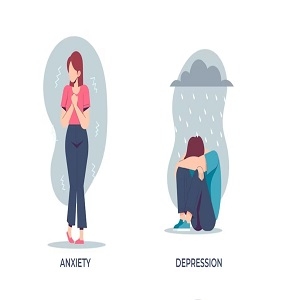Anxiety vs Depression: Understanding the Differences and SimilaritiesPosted by Patnaneuroandchildpsychiatry on June 12th, 2024  In today's fast-paced world, many of us experience moments of intense stress and occasional feelings of sadness. But when these emotions stick around and affect everything we do, it could mean we're dealing with anxiety or depression. It's really important to know the difference between these two because they show up in different ways.
Figuring out these little differences is the first step to getting the right help and starting to feel better. Luckily, there are lots of things we can do to feel better, like talking to someone, trying out therapy or medicine, making changes to our daily habits, or joining a support group. By talking openly about anxiety and depression, we can help each other face these challenges head-on and take back control of our lives. Let's learn more about anxiety and depression and how we can tackle them with strength and kindness.
Understanding Anxiety and Depression: Recognizing the SignsAnxiety and depression are two mental health issues that can really affect how we think, feel, and act. When someone is anxious, they feel super uneasy or worried about things that are going to happen, and this can show up physically with things like feeling restless, having a fast heartbeat, breathing quickly, sweating, shaking, and having trouble concentrating. They might also try to avoid certain places or situations. On the other hand, depression means feeling really sad or hopeless for a long time, and not finding joy in things they used to enjoy. This can come with physical signs like changes in eating or sleeping habits, feeling tired all the time, struggling with feelings of worthlessness or guilt, and having a hard time making decisions or focusing. These conditions can make it tough to go about our daily lives and feel happy overall, so it's important to recognize them early and get help. Talking to mental health experts and trying out different treatments like therapy, medicine, lifestyle changes, and getting support from friends and family can really help ease the symptoms and get us on the path to feeling better. When we understand what anxiety and depression look like, we can take steps to take care of our mental health and improve our well-being. Understanding the differences between Anxiety and DepressionUnderstanding the differences between anxiety and depression is really important because they can seem similar at times. Anxiety disorder usually comes from worrying about things that might happen in the future, and it can show up as sweating, shaking, a fast heartbeat, and trouble focusing. On the other hand, depression is more about feeling sad or empty for a long time, and it can make us lose interest in things we used to enjoy and feel disconnected from the world. Figuring out these differences can be tricky, especially when the symptoms overlap. That's why it's smart to talk to mental health professionals who can help figure out what's going on and come up with a plan to feel better. It might seem scary to ask for help, but it's an important step towards feeling happier and healthier. Remember, there are people out there who want to help you on your journey to feeling better, so don't hesitate to reach out. Treatment Options: Anxiety vs DepressionThankfully, anxiety and depression don't have to be lifelong struggles because there are many ways to help manage their symptoms and take back control of your life. Therapy is a big part of treating both anxiety and depression and lonliness. Techniques like Cognitive-Behavioral Therapy (CBT) and mindfulness-based therapy give you tools to recognize and deal with negative thoughts, develop healthier ways to cope, and build up your strength to handle stress. Therapy gives you a safe place to figure out why you're feeling the way you do and come up with practical ways to feel better. Sometimes, medication can also be helpful for certain people. Doctors might prescribe antidepressants or anti-anxiety medications to help ease symptoms and balance out chemicals in the brain. It's important to work closely with your healthcare team to find the right medication and dose for you because everyone's response to medication is different. Making some changes to your lifestyle can also make a big difference in managing anxiety and depression. Doing regular exercise, eating healthy foods, getting enough sleep, and trying out stress-relief activities like meditation or deep breathing can all help boost your mood and well-being. And don't forget to take care of yourself! Doing things you enjoy, whether it's writing in a journal, spending time outdoors, pursuing hobbies, or simply taking time to relax, can all help lift your spirits and make you feel better. Neuropsychiatrist In Patna For Anxiety And Depression TreatmentFinding a Neuropsychiatrist at Patna for anxiety and depression treatment can be crucial for effective mental health care. Neuropsychiatrists are specialists who can address both neurological and psychiatric aspects of these conditions, providing a comprehensive approach to treatment. Their expertise can help in accurately diagnosing and managing anxiety and depression, offering patients a tailored treatment plan that considers both the brain and behavioral aspects of these disorders. ConclusionIn conclusion, anxiety and depression affect many people and can really impact their lives. But by learning about the signs and seeking help, people can manage these conditions better and work towards feeling better overall. Understanding the differences between anxiety and depression helps people recognize what they're dealing with and find the right support to feel more in control. By trying out different treatment options and finding what works best for you, you can start managing symptoms of anxiety and depression and move toward healing and recovery. Remember, everyone's journey to healing is different, and it's okay to ask for help along the way. You're not alone, and there's always hope for a brighter tomorrow. Like it? Share it!More by this author |


